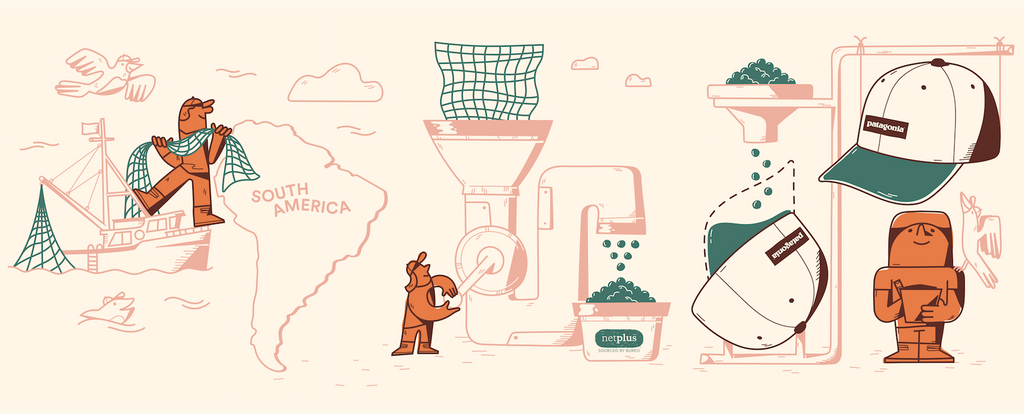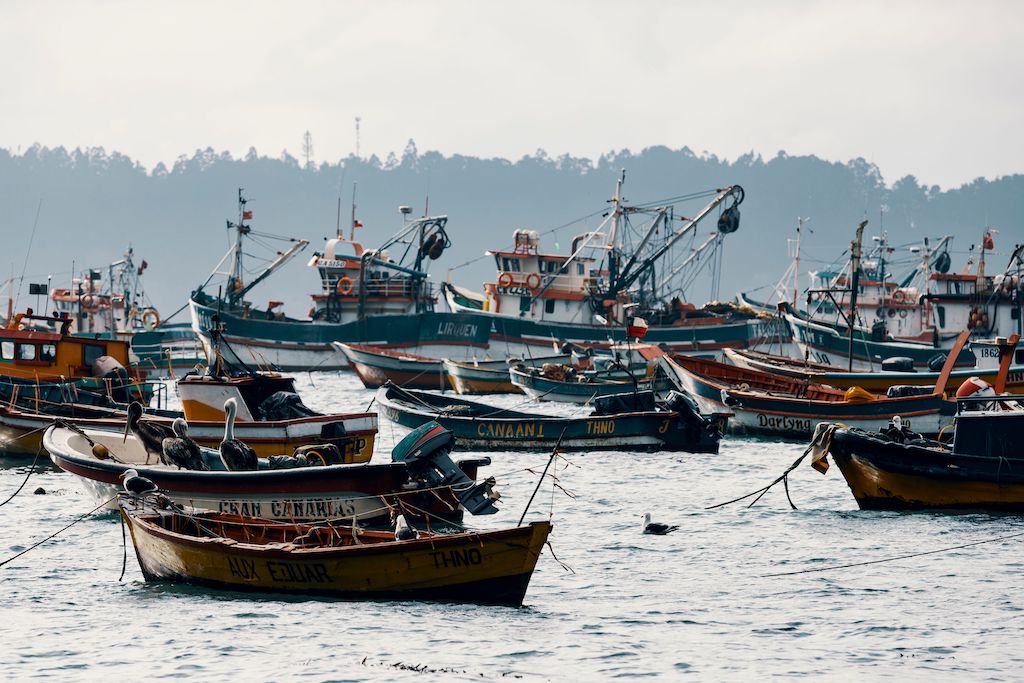Your Cart is Empty
June 29, 2020 7 min read
This week we reached a milestone in a five-year adventure that followed the trials and successes of integrating our recycled fishing nets into Patagonia’s supply chain -- specifically in a 100% recycled hat brim. This story was captured in a fun short film project (watch here). Replacing 23 grams of hidden virgin plastic in every hat is a small step in a longer journey we are on with Patagonia to re-use existing waste and reduce the need for new plastics. In the past, new project releases would be marked by an informal social gathering -- complete with a symphony of reusable aluminum cup cheers with friends. Nothing about these times are normal, and our team wanted to take this moment to share our thoughts on the relevancy of plastic pollution and recycling in light of the overlapping health, environmental and social justice crises.
We were inspired to start Bureo to contribute to the fight against plastic pollution in our ocean, but we acknowledge that protecting our ocean will not be achievable without viewing environmental concerns on balance with social injustices. As a company, we recognize environmental racism exists, and we stand in solidarity against all forms of racism and social injustices. These issues are not new to the plastics industry -- with leading organizations and environmental leaders raising their voices about the exploitation of marginalized communities around the world through the release of toxic waste and air pollution -- restricting access to clean air and water.
Some brief science --sorry in advance. New plastics are made from the distillation of fossil fuels (crude oil or natural gas) at refineries -- which extract the building blocks (monomers) for construction of polymers (plastics). Yes, those shiny ‘clean’ plastics we rely on for almost everything begin their life somewhere that looks like this:

Ironic. Both the extraction and processing of fossil fuels for new plastics, unequally distribute harmful pollutants (benzene, toluene, ethylbenzene, carbon monoxide, ozone, sulfur dioxide, and other volatile organic compounds) in fence line communities in the US and abroad. Additionally, the carbon emissions from these processes are increasing ocean temperatures -- a rising concern. Supply chains for new plastics often undercount critical health risks within communities adjacent to new plastic production facilities, in addition to various end of the line waste impacts in communities where the burdens of plastic pollution are most felt.

So yes, plastics very much pollute from the start to the end of their life -- degrading the health of people and our planet along the way. Simply put - we need to produce and consume less plastic now -- especially the single use varieties!
Don’t take this message second hand from us -- we encourage you to ask questions and pay attention to the plastics issue. It goes way beyond refusing straws and saving turtles. Check out the activism being done by organizations like Algalita, Break Free From Plastics, 5Gyres, Surfrider, Tejas and many more -- to bring awareness to these issues and inspire voices to stand up for change. Check out the Story of Plastic film -- which draws back a curtain on the true cost of plastic pollution. Watch the Patagonia film: District 15, which highlights the work of Communities for a Better Environment, young activists working on environmental justice to stand up to polluting industries implementing oil and gas drilling operations in Los Angeles. And yes -- VOTE for legislation and leaders willing to stand up to protect human health and our environment.
As a planet, we produce over 300 million tons of plastic annually, of which an estimated 8 million tons (17.6 billion pounds) are discarded in our ocean every year. Worse, we are currently on pace to double plastic production by 2030 -- with about 50% of this volume aligned with ‘single use’ products. Lifetimes of harm for a product used only once -- a true waste. As the folks at the Sierra Club say -- Boom Goes the Plastic Industry.

It's clear to us that we won't recycle our way out of the plastic problem, and it's about to get worse. Major fossil fuel companies have introduced plans for 333 new chemical-manufacturing projects in the United States since 2010,amounting to an over $200 billion investment to help expand plastic production. As an industry, there is about $1.5 billion dedicated to small recycling solutions -- representing about a 0.75% investment in recycling compared to new production -- resulting in a failing band-aid on a hemorrhaging pollution wound for our environment. Rolling Stone wrote a kick-ass summary of the problem - read here.
At Bureo, we are aware that recycling projects are being exploited to mask the dramatic increase in plastic production forecast by the fossil fuel industry projects. We find purpose in our work, and see value in preventing waste -- using post consumer recycled materials to reduce the need for new plastics -- but we all need to do more to combat the growth of the plastics industry. As society transitions our energy needs towards cleaner renewable sources, big oil companies are relying on new plastic production to capture lost revenue -- with up to 50% of growth in oil demand tied to petrochemical products by 2050 (according to the International Energy Agency). It’s true that plastics provide functional properties in crucial applications, think medical, transportation, electronics, etc. However, we do not require almost every product we use to incorporate plastic -- and we certainly don’t need half of those products to be single use products -- built from materials made to last for centuries. It’s a broken system.
We believe there is an urgent need to disrupt the status quo of plastic production -- accelerating the development of new supply chains consisting of non-extractive natural, biodegradable and recycled materials. A materials revolution is late to the game, but welcomed.Designing quality products to last with useful end of lives, away from incineration and landfills, also plays heavily into this discussion. Using our ‘Nets to Brim’ as an example, Patagonia was able to replace virgin plastic with 100% post consumer recycled material -- and build in a system to identify the material (label) and allow it to be recycled at its end of life. A circular approach to reintroducing waste into a supply chain -- this stresses that plastic should be used responsibly for products with long lives and built in end of life solutions. We need to imagine a world without landfills -- because we can’t continue to rely on “throwing away” as buried, burned or dumped in our ocean. By definition, that is not sustainable. We live on a finite planet not suited for an infinite amount of waste.

Recycling needs to be employed to combat our waste problems -- but it should not be used to justify a continued trajectory of growth for the plastics industry. Take it from us -- recycling is hard and inefficient. In general, plastics are collected as mixed materials that can not be processed together. It is often hard to extract value from the separation and cleaning of these materials. Our friends at Sustainable Coastlines Hawaii and Kokua Hawaii Foundation tend to the windward shores of Hawaii that filter through the endless smog of plastic dispersing through the Pacific Ocean -- take a look at their work or join a beach cleanup to see the issue and education first hand.

Our focus at Bureo is narrowly aligned with preventing plastic pollution from fishing nets, but we believe our experience over the last 8 years has given us a unique perspective on the issue. Building infrastructure to collect end-of-life plastics before they end up in the ocean can be successful in isolated and targeted programs that are able to capture value from consistent and clean sources of waste that can be repurposed to replace new plastics.

We implement this approach with our community based programs to educate fisheries, provide financial incentives and collect back nets at their end of life -- before they disappear into the depths of the ocean. We strongly believe that if every fishing community had access to education and infrastructure to discard end of life fishing gear that we could dramatically reduce the impacts of this waste.This is a systems based solution that proves that targeted collection programs can provide novel ways to prevent plastic pollution in our environment.

There is much attention paid to the 5.25 trillion pieces of plastic that have infiltrated our ocean waters, but we urge you to take notice of the harmful impacts of this material that extends back through the communities where it was made, and the often underserved communities that bear the brunt of plastic waste’s insidious ability to wreak havoc on ecosystems.
[While it’s helpful to recycle and make use of the plastics already circulating on our planet -- we must find ways to make less new plastics. ]
As one of the many tools in a zero waste system, we must continue to scale and replicate recycling programs to help rebuild a cleaner and safer planet. We strive to continue to use innovation to inspire the next generation to build more responsible products -- and we hope to educate and empower consumers to make conscious decisions.We will work to advocate for environmental justice, and use our platform to influence governments, industries and our partners to use business for good.
We began recycling fishing nets through a community based model, and we pledge to scale our business and mission with shared values for the well being of people and our planet. For now -- one hat brim at a time. Let’s get to work!
Learn More:
Plastic & Health: The Hidden Costs of a Plastic Planet - CIEL - Feb 2019
Plastic & Climate: The Hidden Costs of a Plastic Planet - CIEL - May 2019
Planet Plastic - Rolling Stone - 3 March 2020
Rising Tides, Troubled Waters: The Future of Our Ocean -Rolling Stones - 2 April 2020
Trump's EPA Concludes Environmental Racism Is Real - The Atlantic - 28 Feb 2018
Suggested Films:
